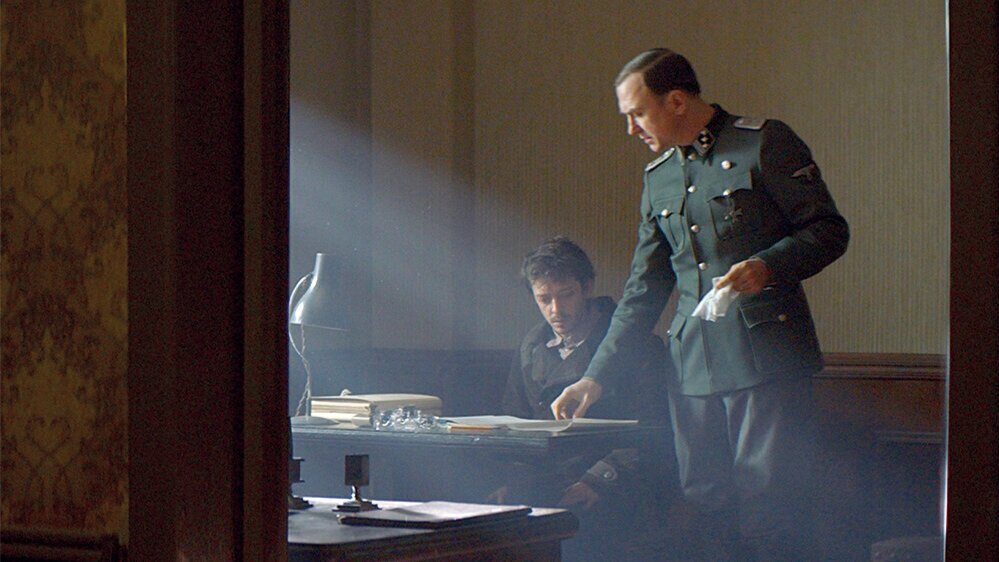Persian Lessons
Vadim Perelman's highly individual work is set to divide audiences.
Nahuel Pérez Biscayart and Lars Eidinger
Best known here for his first feature film, 2003's House of Sand and Fog, Vadim Perelman was born in Ukraine, has spent much time in Canada and works in many locations. No real surprise, therefore, that his latest piece, Persian Lessons, should be an adaptation by Ilja Zofin of a novel by Wolfgang Kohlhaase which is concerned with the Holocaust. The year is 1942 and the central character is a young man named Gilles (Nahuel Pérez Biscayart) who, when his fellow Jewish prisoners face a firing squad, escapes their fate by a freak chance of luck. He happens to have on him a Persian book dealing with that country's myths and to hide the fact that he is indeed Jewish he claims to be Persian himself. The Germans present at once take note because they know that Klaus Koch (Lars Eidinger), an overseer in the transit camp, is looking for somebody who is Persian. Believing that his estranged brother is in Tehran, Koch hopes that once the war is over to travel there and to open a restaurant. However, if he is to achieve this he needs somebody to teach him Farsi. Gilles is accordingly given daytime work in the camp kitchen on the understanding that he will became Koch's language teacher in the evenings. There is only one snag: in addition to not being Persian he does not know Farsi and, if he is to remain undetected, he will have to invent an imaginary language that can pass as being the real thing.
This is a story that may sound too unlikely to be believable, but there is a paradox at the heart of Persian Lessons: although it does demand a leap of faith on the part of the viewer, it is actually based on true events. Rather to my surprise I made that leap and enjoyed the film although it is a work which following its presentation at the 2020 Berlin Film Festival was much praised by some while being roundly condemned and ridiculed by others. Those taking the latter view complain that, as told here, comedy is introduced into a setting in which to do that is made offensive by the grim historical context (a comparable issue proved fatal to Jerry Lewis when he made the unreleased movie The Day the Clown Died). However, although what we see in Persian Lessons is rich in absurdist irony, it is never played for laughs as such and the humour is at the expense of the Germans. Furthermore, the film is at pains to stress the horror of the Holocaust (indeed it ends with 2840 names being listed, these names being the victims who met their deaths in this particular camp).
The film's basis in fact can't hide the improbabilities inherent in the story and that is why to appreciate Persian Lessons one has to suspend disbelief. One is encouraged to do that by the efficiency of Perelman's direction even if the running time of over two hours does seem unnecessarily long. Even more important to one's pleasure is the quality of the two leading performances: Nahuel Pérez Biscayart and Lars Eidinger are both perfectly cast. Early on in his portrayal of Klaus Koch Eidinger suggests the underlying menace while also allowing the audience to enjoy the foolishness of the man as he stupidly believes that Gilles really is teaching him Farsi. In view of that, it is all the more surprising that we come to see Koch eventually as a man whose involvement with the Nazis is actually alien to his deeper nature: our last view of Koch might be expected to be the biggest laugh of all, but Eidinger's performance is so finely tuned that he makes the scene one that reveals Koch as a pathetic figure. However, the other Germans stand fully condemned and the story (this part doubtless is fiction) even gives us in Max (Jonas Nay) a soldier whose determination to expose Gilles makes him the man we love to hate.
There's no question but that Persian Lessons is a strange film yet it contains two of the best performances we are likely to see in 2021 and, in taking a factual situation and rendering it as a larger than life tale, it also manages to bring together an entertainingly exaggerated narrative and an unusual but heartfelt condemnation of all the human suffering involved in the Holocaust. The film is certainly no masterpiece but, as genuine oddities go, it stands out and on its own terms it works.
MANSEL STIMPSON
Cast: Nahuel Pérez Biscayart, Lars Eidinger, Jonas Nay, David Schütter, Alexander Beyer, Andreas Hofer, Leonie Benesch, Luisa-Céline Gaffron, Nico Ehrenteit, Giuseppe Schillaci, Antonin Chalon.
Dir Vadim Perelman, Pro Rauf Atamalibekov, Timur Bekmambetov, Pavel Burya, Vadim Perelman, Ilja Zofin and others, Screenplay Ilja Zofin, from the novel Erfindung Einer Sprache by Wolfgang Kohlhaase, Ph Vladislav Opelyants, Pro Des Dmitry Tatarnikov, Ed Vessela Martschewski, Music Evgueni Galperine and Sacha Galperine, Costumes Alexey Komyshov.
Hype Film/LM Media/ONE TWO Films/Belarusfilm-Signature Entertainment.
127 mins. Russia/Germany/Belarus. 2020. Rel: 22 January 2021. Available on VOD. Cert. 15.


